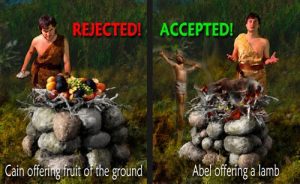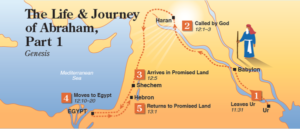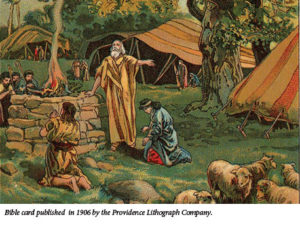In the book of Hebrews there have been many comparisons of the old covenant and the new one. We have been told how superior Jesus Christ is to prophets, angels, Moses, high priests. We have looked at the items found in the Old Covenant temple and the entire law itself, and how those things point to a better and greater reality in Christ. We have been reading how Jesus Christ is our high priest, our sacrifice, our curtain to the most holy place, our gate, our way to God. Hebrews 10 talks of encouragement; we should be encouraged to draw near to God. We should have confidence in the Works of Jesus Christ and the Grace and Mercy offered to us. We should look no further than Jesus Christ, because there is no other sacrifice for sin that remains. We should continue to encourage one another and meet up together. Having this confidence to stand firm in what we believe takes faith.
38 And, “But my righteous one will live by faith. And I take no pleasure in the one who shrinks back.”
39 But we do not belong to those who shrink back and are destroyed, but to those who have faith and are saved.
Hebrews 10 ends by saying we should live by faith. God doesn’t take pleasure in those who shrink back are destroyed, those who do not persevere in their faith, those who do not stand firm. Those people are not of us. Instead of shrinking back, we persevere. Instead of losing faith, and are destroyed, we belong to those who have faith and are saved. Chapter 11 is all about faith.
Now faith is confidence in what we hope for and assurance about what we do not see. 2 This is what the ancients were commended for. 3 By faith we understand that the universe was formed at God’s command, so that what is seen was not made out of what was visible.
So what is faith? Faith is like a degree of trust that you have. Faith is a confidence level, and the Bible says it is being confident in what we hope for and assured in what we do not see. When you see something happening, you no longer have faith in that thing, you know that thing is happening.
If there’s a brand new bridge that was built, you might have a certain degree of faith that it will support you to cross it. That faith level might depend on how good the architect or engineer of the bridge is, how careful the builders were to make it, how good the materials are, the weather conditions. Your level of faith or confidence might increase if you see more people successfully cross the bridge. Your confidence might decrease if years pass and you see the bridge getting frequently used and older with more wear and tear. Faith and Reason go hand in hand. They are not opposed to each other in the least bit.
In Statistics we talk about confidence intervals and degrees of confidence, probability of uncertain future events. When the event happens and the outcome is known, there is no longer uncertainty. When you cross the bridge successfully and you see the answer, no longer is faith required or the concept of uncertainty relevant. Having Faith or lacking faith leads to acting a certain way or not acting another.
Vs 3 says It takes faith to understand that the universe was created by God, because we weren’t there, or if we in some way witnessed the creation, we don’t currently have a memory of seeing it. Everything we see was created by some force that is not visible to us. Even scientists who believe the big bang happened must have a certain amount of faith that there was a beginning event that caused matter and space and time to move the way we witness. Things that were made (the creation, the universe) were made and caused by something that is not visible to us, and was done so in a way that is not fully explained by what we currently see. Christian and Jewish faith attributes that event, the creation, to a Creator who is beyond space, time, matter. Some scientists attribute that event to a what they call a singularity where there was infinite density and infinite temperature at a specific time in the past. These two aren’t necessarily opposite accounts of the beginning. Either way, we are approaching the limits of comprehension of our finite brains. Any time we discuss concepts like eternity, infinity we think about things that are unseen, and that takes faith. From verse 4 on, there are a lot of examples of Faith in Hebrews 11. These examples are taken from Scripture, so the Hebrews would have been well versed in all of the individual stories. Going through each example and explaining and teaching the story found in each example would take many months of messages and Bible studies. On the other hand, just reading the one verse summary of each example in Hebrews is a quick refresher of each story, but it might not be sufficient to discuss the full extent of how and why each example truly glorifies Christ. So we will read and discuss a few, but this is by no means a complete teaching on the subjects.
4 By faith Abel brought God a better offering than Cain did. By faith he was commended as righteous, when God spoke well of his offerings. And by faith Abel still speaks, even though he is dead.
Abel and Cain were brothers, born of Adam and Eve. Abel brought an animal offering to God, where Cain brought a fruit basket. Now to someone who hasn’t studied scripture, this might seem like a trivial and arbitrary difference in offering. It might seem almost unfair of God to treat Cain’s offering as inferior to Abel’s. Abel tended flocks and Cain worked with the fruits of the soil, so each one gave a portion of their things. Scholars have theorized many reasons that Abel’s gift was better than Cain’s. One was living, the other was lifeless. Abel’s had grown spontaneously, Cain’s had grown as a result of human ingenuity and interaction. One was stronger, the other weak. One involved blood, the other didn’t. But going back to Adam and Eve’s first sin, we see God requiring blood as a necessary sacrifice for sin. They covered themselves with fig leafs, but God made them a covering of animal skin. The author of Hebrews stated that without the shedding of blood, there’s no payment for sin. This might be where Abel’s gift mostly differed from Cain’s. What’s the purpose of the gift? If the goal of giving a sacrifice to God was to make an apology for sin, Abel’s gift was given with an understanding that his sin was important, costly, and severe. Abel’s was given with the intention to please God, to obey God. Cain’s gift seemed more like a false apology. It was a gift given in a way that demonstrated a disregard for obedience. Why? It was a gift that Cain devised on his own instead of following certain Godly commands and precedent. Cain’s gift was done Cain’s way instead of God’s way. Jude 11 describes the “Way of Cain” to be people who have little regard for God’s way, imagining their sin to be not so severe. People who follow the way of Cain believe that they are pretty good, and should be righteous enough on their own to be acceptable before God. Following the way of Cain means coming before God saying, “look what I planted, see what I grew, I put this together, and made this for you.” Instead of Abel’s apologetic confession and gift that says, “my sin is terrible. All my disobedience leads to is death. I am not worthy. God’s way was better than my own,” Cain’s gift was a gift designed to make Cain look good before God. God warned Cain to do well, but Cain disregarded the warning and murdered his brother. This was the first murder. Abel was the first of many martyrs, and Cain was the first to not just kill someone but do so because of his Beliefs and relationship to God. Cain was jealous of Abel’s relationship with God, he was by no means an athiest, he gave gifts to God. His religion appeared nice, but was false. What does this have to do with Faith? Faith in ones self leads to going the way of Cain. Faith that God’s way is the only way leads to being made righteous
5 By faith Enoch was taken from this life, so that he did not experience death: “He could not be found, because God had taken him away.”[a] For before he was taken, he was commended as one who pleased God. 6 And without faith it is impossible to please God, because anyone who comes to him must believe that he exists and that he rewards those who earnestly seek him.
The next person discussed is Enoch. Enoch followed God and pleased God. Enoch was rewarded for following God and never saw or experienced Death. This result seems like the total opposite of Abel’s faith. Abel’s faith led to his own martyrdom and death. Enoch’s faith led to a long life and no death at all. We need to be prepared for either type of outcome as a result of our faith. If we are punished for our faith by fellow humans, our persecution glorifies Christ, because it’s really Christ who we represent, and it’s Christ who they have a problem with. If you are persecuted for your faith and obedience to God, it’s not about you. It’s about Christ. On the other hand, if you are rewarded for your faith, it is God who you are honoring, and the best rewards come from God; the only rewards worth pursuing come from God. So now the author explains some of his reasoning. The fact that Enoch Pleased God means that he had faith in God. In fact, it is impossible to please God, unless you have faith and trust in God. Remember what we discussed earlier. Faith is confidence in what we hope for and assurance of what is unseen. God is unseen, so to even believe that he exists means you need to have confidence, assurance, faith. But just believing and having faith that God exists isn’t enough. In the book of James, he writes
You believe that there is one God. Good! Even the demons believe that—and shudder.
Cain believed God existed, made offerings to God, and actually spoke to God. Cain had a faith in God. But it wasn’t a saving faith in God. You must also believe that God rewards those who earnestly seek him. This is faith that God is worth Earnestly seeking. The faith that God is Good, that pleasing God is rewarding. If I believe God is Good, then I believe that the things that please God are worthy things to do. If I believe God rewards acts of mercy, love, and kindness, I will seek to please God by being merciful, loving, and kind. I will have faith and trust that even if the reward doesn’t end up the way I foresee, or expect it to, pleasing God is reward enough. If you believe in God, and have faith he exists, that’s good first step. But you also need to believe things about God. You need to believe things about God’s nature, and His Goodness. You need to believe that He is not indifferent between various actions. If I do terrible things, Does God even care? If He doesn’t care, then He isn’t all that Good. If he does care, but can’t reward behavior that pleases him, then God isn’t powerful or willing to act. James wrote how true faith leads to works. The author of Hebrews also affirms this. All the examples in this chapter say, By Faith this person Did this thing. If we read ahead to Hebrews 11:7 the next example is Noah. Most people know about Noah and the ark. He lived during a time in history that was marked by mankind’s wickedness. Genesis 6:5 says it this way:
5 The Lord saw how great the wickedness of the human race had become on the earth, and that every inclination of the thoughts of the human heart was only evil all the time.
Peoples thoughts and minds had turned away from God, they had relied on the inclination of their own heart instead of God’s instruction. One man was different. Genesis 6:9 describes Noah. Noah was a righteous man, blameless among the people of his time, and he walked faithfully with God. What do we know about Noah? He was not like anyone else in the world. He did not follow the inclination of the thoughts of his human heart. When we follow our hearts and put our faith and trust in ourselves, we end up walking the way of Cain. But when we have our faith and trust in God, we can live lives that please Him. Noah lived in a righteous solitude. In an entire world full of wickedness with plenty of blame to go around, Noah lived blameless. He checked out. He didn’t partake in the way of the world. Instead he walked faithfully with God. Noah’s faith and assurance in God led him to live differently. Living differently and earnestly seeking God led Noah to a point in his life when He could hear the voice of God speak to him. But when God spoke to Noah, it wasn’t just a note of congratulations. He gave a warning; God was to wipe out all mankind with floodwaters. God said he was going to establish a covenant with Noah. There were instructions, build an ark, gather pairs of animals and food. Genesis 6:22 said, “Noah did everything just as God commanded him.” Here’s how Hebrews describes this.
7 By faith Noah, when warned about things not yet seen, in holy fear built an ark to save his family. By his faith he condemned the world and became heir of the righteousness that is in keeping with faith.

We read again that Noah received a warning from God about something that had remained unseen. Noah was listening to an unseen God warn him about an unseen future. Noah had to ignore a lot of things that he saw right in front of himself. He had to tune out a lot of voices that were from people he could see. He had to sacrifice things that seemed more certain, to prepare for something unseen. If I am given a rain forecast of 25%, I might not even bring an umbrella. 3 times out of 4 I am fine.. But Noah received a forecast of 40 days of rain. What are the chances of that? Noah had faith in God’s warning, and assurance in the greater unseen thing that he was hoping for. Was he hoping for a flood? Not really, but he WAS hoping for God’s will to be done, which meant he was hoping for a world that wasn’t full of wickedness everywhere, a world where people weren’t always selfish, a world where people treated each other as they would treat themselves. He trusted God’s plan over his own. When he built the ark and boarded it, he was leaving behind something he could see for the hope of something better. That decision required faith and confidence, assurance of what he was hoping for, and confidence that the One who told him the warning was good and trustworthy. The author of Hebrews moves along history to Abraham, another man who was looking for a different city, a different world.
8 By faith Abraham, when called to go to a place he would later receive as his inheritance, obeyed and went, even though he did not know where he was going.
Abraham obeyed God and went. That action was the result of faith, He had confidence in something that he was hoping for. The thing he was hoping for was fulfillment of promises from God. The promises were an Inheritance from God himself. He had assurance of something that was unseen to him. He packed and left to another place. The promise result was so unseen and unknown that he didn’t even know where he was going.
9 By faith he made his home in the promised land like a stranger in a foreign country; he lived in tents, as did Isaac and Jacob, who were heirs with him of the same promise. 10 For he was looking forward to the city with foundations, whose architect and builder is God.
When he arrived he wasn’t greeted with open arms, he wasn’t given riches or wealth. He lived like a stranger in a foreign land. He could have stayed in Egypt and lived in wealth he had acquired there. When he made a choice to split up with Lot, he could have opted to live in the rich and well watered plains near Jordan in the prosperity from the city of Sodom. Instead he lived in the midst of great trees near Hebron. He didn’t even have a permanent fixed residence or home. He lived in tents. Instead of settling down and building a house, he built altars. His son Isaac lived in tents, His grandson Jacob (later named Israel) lived in tents. All of them were heirs of the same promise. God would build Abraham’s offspring Isaac into a nation. There would be descendants as numerous as sand on the beach. Through Abraham’s offering, All Nations would be blessed. Genesis 15 talks about when God made this promise to Abram. This is the part of the Bible where it says Abram believed the Lord, and it was credited as righteousness. Abram believed the Lord, He had faith. He was not righteous on his own, his faith and hope in the unseen future was credited as righteousness. This verse in Genesis 15:6 is discussed in a lot of different places and is a precedent for why we can believe in a salvation based on faith, which results in righteousness credited to us. But as it was unfolding before Abram, and Issac, and Jacob, each of them saw a perfectly good alternative, according to the measures and standard of the world, but were holding out for the unseen hope. They were looking forward to a city and foundation who’s architect and builder is God.
11 And by faith even Sarah, who was past childbearing age, was enabled to bear children because she considered him faithful who had made the promise. 12 And so from this one man, and he as good as dead, came descendants as numerous as the stars in the sky and as countless as the sand on the seashore.
Abram and Sarah were faithful to God, and that faith resulted in God Giving them the ability to have children. Because of faith in God’s promises, Abram and Sarah had the offspring, and through that offspring countless descendants. One of those Descendants was Jesus Christ, and through him, all nations have been blessed. We know how the story ends, so we see the things that were unseen to Abram and Sarah. But they never saw it come to completion. In fact, just after God gave Abram the promise, he gave another promise Let’s read it quickly Genesis 15:12-16
12 As the sun was setting, Abram fell into a deep sleep, and a thick and dreadful darkness came over him. 13 Then the Lord said to him, “Know for certain that for four hundred years your descendants will be strangers in a country not their own and that they will be enslaved and mistreated there. 14 But I will punish the nation they serve as slaves, and afterward they will come out with great possessions. 15 You, however, will go to your ancestors in peace and be buried at a good old age. 16 In the fourth generation your descendants will come back here, for the sin of the Amorites has not yet reached its full measure.”
Sometimes it’s better to not know what will happen, and the dreadful darkness that comes from it. Had I heard this promise, I would have been angry at God. What does the Amorites’ sin have to do with my offspring? Why does punishing evil take priority to the peace and freedom of my descendants? I would have been overwhelmed by the dreadful darkness. Sometimes God’s will for others intersects with our will for ourselves, and it is a painful and difficult thing to experience.
13 All these people were still living by faith when they died. They did not receive the things promised; they only saw them and welcomed them from a distance, admitting that they were foreigners and strangers on earth.
Everyone was still living by faith when they died. If you really analyze what happened here, God gave a promise, and never delivered it in the lifetime of the people he gave it to. From a worldly perspective, it seems like Abram bet on the wrong horse. He took the long shot and it didn’t pay off. Faith doesn’t always appear to work out to the ungodly observer. The Bible explains that the cross is foolishness to those who are perishing. Paul says If there is no resurrection, we are to be the most pitied. The promises God makes are great, but like Abraham we won’t see the end result. If he had lived to see the end result, it would no longer be faith that he was living by. Abraham didn’t mind and welcomed the promises from a distance. In so doing, he admitted that he was a foreigner or a stranger on Earth. Remember the story of the offering from the poor widow? Jesus watched a bunch of people put various amounts of money in the Temple offering, but one poor widow gave two coins which had little to no worth. It was a gift that was worthless to the temple, and was all she had to live on. That gift illustrated her faith. She had confidence and hope somewhere else, she was a stranger here on earth, and she was living with confidence in the things that are unseen.
14 People who say such things show that they are looking for a country of their own. 15 If they had been thinking of the country they had left, they would have had opportunity to return. 16 Instead, they were longing for a better country—a heavenly one. Therefore God is not ashamed to be called their God, for he has prepared a city for them.
People who admit they are foreigners or strangers here affirm that they are looking for a country to call their own. I love to travel. Next week I will be leaving to take a pretty long trip. Going to a different place is enjoyable because there are different cultures. Different foods, Different ways of doing things, different values, different money and prices, Different art and music. It’s fun to compare how things are the same as back home, and how things are different; to see how other people live. There are things I like about the United States. There are things I dislike. As I drill down, there are things I love about Philadelphia, and there are things I really dislike. The reason I like some things and dislike others is shaped by what I believe and what I value. A lot of that valuation has either grown or diminished because I learned what God values and what types of things are important to my God, and my Lord and My King.
I think it’s human nature to remember sad things and traumas and tragedies more than happy ones. It’s easy to dwell on the things you dislike and lose focus on the good things. If you’re prone to pessimism or defeatism, you know what I mean. And then Sometimes there are optimistic Christians who put on this face that everything is great and ok, and we should focus on the good things. That has it’s place, but it can also seem plastic or fake. When you honestly observe the world around you, it can seem depressing, overwhelming, or hopeless. That’s not always bad. It shouldn’t be ignored like the overly optimistic Christians might do. When you see the world around you and think it’s hopeless, that may lead you to place your hope in something you Can’t see. When you’re hoping for something better that you don’t see, you are exercising your faith. That exercise may cause you to long for a better country, a heavenly one.. As Christians, no matter what type of government we live under in this world, whether we live in a democracy, a republic, an earthly kingdom, parliamentary system, we are actually citizens of a different kingdom. We are citizens of God’s Kingdom of Heaven. Our hope is in the unseen, our values come from the written Word of our King, our example comes from the Living Word of the King who became flesh. Our Counsel comes from the Holy Spirit of our King. And our faith and hope, our confidence is in that King to call us His people, and we call Him our God, and he has prepared a place for us to be with him.









